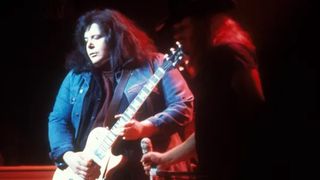Leslie West Decodes His “Mississippi Queen” Tone
Leslie West gives GP the skinny on how he got his "Mississippi Queen" sound.

This is an excerpt from an archival GP interview with Leslie West.
“Mountain's first gig was at Fillmore West in 1969,” remembers Leslie West. “I had been using Marshall amps, and that’s what I expected to find when I opened a bunch of cartons that had arrived from the airport, but instead I got a Sunn - and it wasn’t even a guitar amp.
"The cartons contained a Sunn Coliseum P.A. head and four 4x12 cabinets, and I thought, ‘There’s no way I can get a good tone out of this thing.’ But the head had four microphone inputs and a master volume control, and when I plugged in and turned it up I got this amazing tone, which became my sound.
"And remember, this was years before amps had master volume controls. The head had huge transformers and gigantic KT88 tubes, and the cabinets were loaded with Eminence speakers, which never hurt your ears even with the treble all the way up. That’s the amp I used on Mountain Climbing, which included ‘Mississippi Queen.’”
West was playing a couple of ’50s Gibson Les Paul Juniors at the time “Mississippi Queen” was recorded: a 1956 single-cutaway and a slightly newer double-cutaway.
“The single-cutaway had a better sound than the other one,” he recalls. “And back then I used to string them with standard sets of La Bella Electric Guitar strings, but I’d substitute .010-gauge A banjo strings for the high-E strings and move the other five strings down one slot, because you couldn’t get extra-light sets at that time.”
The single P-90 pickups in those guitars were essential to West’s tones, but they tended to feed back and could be difficult to control.
“It always felt like the guitars were trying to jump out of my hands,” he says. “And the controls didn’t do much. Between about 1 and 6 the volume controls would give you a clean tone, then around 7 to 9 the sound got a little dirtier - but when you turned them up to 10 you’d get this extra blast of sound.
"I usually played with the tone controls fully open, because you didn’t get much variation when you rolled them back, unless you rolled them all the way off.
“These days, I can pretty much get the ‘Mississippi Queen’ tone out of any guitar. Larry DiMarzio once told me my tone was in my right-hand attack, and he was right. Also, I never felt like I needed a two- or three-pickup guitar, because you can get a lot of tones out of a single pickup. If you’re in a room filled with gasoline, how many matches do you really need? One good one and a backup!”
Get The Pick Newsletter
All the latest guitar news, interviews, lessons, reviews, deals and more, direct to your inbox!

“Noel’s process is purely guitar. He’s so in love with the chords, and he was cycling through and through... He wouldn’t stop until he was satisfied”: How Noel Gallagher and Beck helped bring the Black Keys' latest funky full-length, Ohio Players, to life

“Sometimes things like that just come together, like a piece of magic. I wrote that song in just five minutes”: Dickey Betts on dueling with Duane Allman, composing Allman Brothers' biggest hit, and the oddball Les Paul/SG hybrid he “personally designed”
Most Popular








